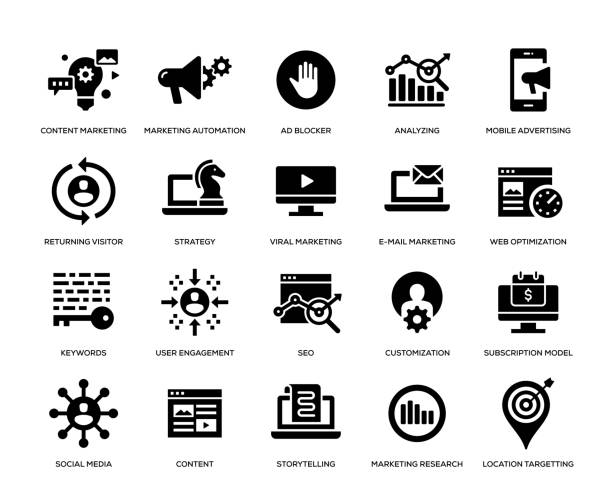You must have seen or heard this and you want to know what is B2B digital marketing and how to approach it. I believe, you know what is marketing and digital, just in case you don’t, we will extensively explain them.
Then the bone of contention is B2B which will discuss are we proceed.
In the business of online marketing, there is a different sector called B2B digital marketing.
This isn’t about impulsive purchases fueled by catchy jingles. It’s a strategic chess game, where every move aims to build trust, nurture relationships, and ultimately, close lucrative deals between businesses.
B2B simply stands for business to business. The full definition is below.
If you’re a B2B brand navigating the digital jungle, fear not!
This comprehensive guide unveils the secrets of B2B digital marketing, equipping you with 12 powerful strategies to attract the right clients, generate leads, and convert them into loyal business partners.
Buckle up, because we’re about to crack the code to B2B online success.
Key Takeaways
- Businesses offer their products and services to other businesses online through a process known as business-to-business, or B2B, digital marketing.
- Businesses in Nigeria who wish to succeed in the current market need to employ B2B digital marketing; it’s not simply a fad.
Table of Contents
What is B2B Digital Marketing?
B2B digital marketing refers to the art and science of promoting and selling products or services to other businesses.
It’s about understanding the unique needs and decision-making processes of B2B buyers and then crafting targeted online strategies to win their trust and loyalty.
Remember, B2B marketing is about creating value for other businesses, not just selling products or services.
Focus on understanding their needs, pain points, and decision-making processes, and then tailor your strategies accordingly.
In short, B2B digital marketing involves a business or brand promoting goods and services to other companies or business, groups using internet platforms and digital tools.
Top 12 Digital Marketing Strategies and Platforms

1. UX Content is King
Forget generic blog posts and fluffy brochures. B2B buyers crave in-depth, insightful content that demonstrates your expertise and addresses their specific challenges.
White papers, industry reports, webinars, and case studies are your weapons of choice, establishing you as a thought leader and trusted advisor.
2. LinkedIn: Your Professional Playground
LinkedIn isn’t just for online resumes. It’s a bustling B2B networking hub, where you can connect with potential clients, engage in industry discussions, and showcase your thought leadership.
Optimize your company page, share valuable content, and actively participate in relevant groups to build relationships and generate leads.
3. Email Marketing
B2B email marketing isn’t about giving generic blasts. It’s about personalized nurturing campaigns that guide leads through the buyer’s journey.
Segment your audience, tailor your messages, and offer valuable content at each stage to build trust and convert leads into customers.
4. Account-Based Marketing (ABM): Laser Focus on High-Value Accounts
Not all leads are created equal.
ABM lets you prioritize and target high-value accounts with personalized, multi-channel campaigns.
Imagine tailoring social media content, website experiences, and even email sequences to specific decision-makers within your target companies. That’s the power of ABM.
5. Targeted Paid Advertising
Organic reach in the digital world can be fickle. Paid advertising platforms like Google Ads, Facebook Ads, and LinkedIn Ads come to the rescue, allowing you to target your ideal B2B audience with laser precision.
From search engine ads to social media promotions, paid advertising can propel your brand to the top of the B2B search results.
6. Video Marketing
In a world bombarded with text, video stands out. Create compelling explainer videos, customer testimonials, and industry insights to capture attention, explain complex concepts, and build trust with B2B buyers.
Some of your audience are not patient enough to read the long text, but if it could be engagingly told in a video, it will stand out and convert your leads.
7. Website Optimization
Your website is your B2B digital storefront. Make it user-friendly, informative, and optimized for conversions.
Showcase your value proposition, address pain points, and guide visitors through the sales funnel with ease.
Your first mantra is the make your website user-friendly. The UI/UX is core just like the Google Core Web Vitals.
Let it be optimized to fit the search engine and humans.
8. Social Proof and Testimonials – Word of Mouth
Don’t just tell B2B buyers how great you are; show them! Leverage customer testimonials, case studies, and industry awards to build social proof and establish trust.
Positive reinforcement from satisfied clients can be your most persuasive marketing tool.
Also, when people see your product or services and how excellent they are to them, they will do the marketing for you in your absence. It is called word of mouth.
9. Analytics and Data-Driven Decisions
Guesswork has no place in B2B digital marketing. Track your campaigns, analyze website traffic, and measure performance metrics to understand what’s working and what’s not.
Data-driven insights empower you to optimize your strategies and maximize your return on investment.
10. Influencer Marketing: Leverage Industry Experts
Partnering with industry influencers can give your B2B brand a powerful boost.
Identify thought leaders relevant to your niche and collaborate on content creation, joint webinars, or social media campaigns to tap into their established audience and gain industry credibility.
11. Community Building: Foster Connections and Collaboration
Building B2B relationships requires trust and collaboration. Creating online communities, hosting industry events, and participating in relevant forums are effective ways to foster connections with potential clients. By doing so, you can build a loyal network around your brand, leading to long-term partnerships and business growth.
12. Mobile Optimization
In today’s mobile-first world, it’s crucial to prioritize mobile optimization for your website, content, and email campaigns.
Neglecting mobile compatibility is akin to isolating yourself in a ghost town, missing out on valuable engagement and interaction.
Ensure a seamless user experience across all devices to maximize your reach and impact.
What are The Best Digital Marketing Tools?

The “best” digital marketing tools depend heavily on your specific needs and budget.
1. Content Creation & Management
- Canva: User-friendly design platform for creating stunning visuals like social media graphics, presentations, and infographics.
- Semrush: Powerful SEO tool for keyword research, content topic suggestions, and competitor analysis.
- Buzzsumo: Helps discover trending content and identify top performers in your niche.
- HubSpot Marketing Hub: All-in-one platform for content creation, management, and social media scheduling.
2. Social Media Marketing
- Hootsuite: Manage multiple social media accounts from one platform, schedule posts, and track performance.
- Sprout Social: Similar to Hootsuite, offers additional features like social listening and engagement tools.
- Buffer: Simplifies social media scheduling and provides analytics to track engagement.
- Later: Focuses on visual content for Instagram and Pinterest, offering scheduling, analytics, and hashtag suggestions.
3. Email Marketing
- Mailchimp: Free plan for basic email marketing needs, with paid plans for advanced features.
- Constant Contact: Easy-to-use platform with drag-and-drop email builder and automation tools.
- Drip: Advanced email marketing automation platform with powerful segmentation and personalization capabilities.
- ConvertKit: Geared towards creators and bloggers, offering landing pages, email sequences, and subscriber management.
4. Website Analytics
- Google Analytics: Free and widely used platform for tracking website traffic, user behavior, and conversions.
- Hotjar: Provides heatmaps, session recordings, and feedback tools to understand user behavior on your website.
- Similarweb: Competitive intelligence tool that offers website traffic insights, audience demographics, and keyword rankings.
5. SEO Optimization
- Ahrefs: Comprehensive SEO toolset for keyword research, backlink analysis, and on-page optimization.
- Moz Pro: SEO platform with site audits, keyword research, and competitor tracking.
- Yoast SEO: WordPress plugin providing on-page optimization suggestions and technical SEO improvements.
- Semrush: Unlike Ahrefs and Moz, Semrush provides you with all the analysis you need to do on your website. From site audit to keyword research and traffic analysis.
6. Paid Advertising
- Google Ads: Pay-per-click advertising platform for reaching users searching for specific keywords.
- Facebook Ads: Powerful platform for targeting specific demographics and interests on Facebook and Instagram.
- LinkedIn Ads: Professional networking platform offering B2B targeting options.
7. Project Management & Collaboration
- Asana: Project management tool with task assignments, deadlines, and team communication features.
- Trello: Visual project management tool with boards, cards, and lists for easy organization.
- Slack: Real-time communication platform for teams, facilitating collaboration and information sharing.
This is just a starting point, and the best tools for you will depend on your specific needs and budget.
Research, compare features, and consider free trials before making any decisions.
Conclusion
B2B marketing is a marathon, not a sprint. Be patient, experiment, and continuously refine your strategies based on data and insights.
By implementing these best practices and staying focused on creating value for your target audience, you can achieve great B2B digital marketing success.


